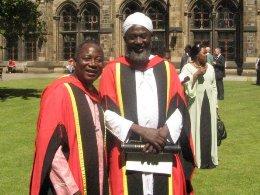At a ceremony to mark Glasgow University’s Commemoration Day on 16 June 2010, Honorary Degrees were conferred on nine people, including the Degree of Doctor of the University on both Imam Dr Muhammad Ashafa and Pastor Dr James Movel Wuye. They were presented by the Professor of Divinity, Werner Jeanrond. (Oration reproduced below.)
 The following day the film The Imam and the Pastor was shown in the University Chapel by the Interfaith Chaplain Rev Stuart MacQuarrie and Professor David Fearn, Dean of Information and Mathematical Sciences and University Religion and Belief Equality Champion. The lunchtime audience was privileged also to see a preview of the new film, An African Answer, depicting the mediation methods used in the critical situation of the recent Kenyan conflicts. Discussion was lively and prolonged, and in bringing these values into the mainstream life of the University, the occasion fulfilled the intention of the Equality and Diversity Unit and its pioneering Director Naseem Anwar. The welcome extended to all was generous and inclusive.
The following day the film The Imam and the Pastor was shown in the University Chapel by the Interfaith Chaplain Rev Stuart MacQuarrie and Professor David Fearn, Dean of Information and Mathematical Sciences and University Religion and Belief Equality Champion. The lunchtime audience was privileged also to see a preview of the new film, An African Answer, depicting the mediation methods used in the critical situation of the recent Kenyan conflicts. Discussion was lively and prolonged, and in bringing these values into the mainstream life of the University, the occasion fulfilled the intention of the Equality and Diversity Unit and its pioneering Director Naseem Anwar. The welcome extended to all was generous and inclusive.
“Chancellor, by the authority of Senate, I present to you these persons on whom the Senate desires you to confer the honorary degree of Doctor of the University (DUniv):
Imam Dr Muhammad Ashafa and Pastor Dr. James Movel Wuye
Both our honorary graduands are joint Executive Coordinators of the Interfaith Mediation Centre at the Muslim-Christian Dialogue Forum in Kaduna, Nigeria. In that part of Nigeria which has suffered from religious tensions and shocking clashes between Muslims and Christians this Imam and this Pastor have been working together to teach warring Christian and Muslim militias to resolve their conflicts by peaceful means. Their work, courage and example are of great significance not only for this troubled part of Nigeria, but for any context of inter-religious and inter-cultural tensions, conflicts and clashes. Moreover, their personal history and the emergence of their friendship provide a challenge both to any kind of inter-religious warfare and to every person’s relationship to manifestations of religious and cultural otherness. Every human person’s religious conviction needs to grow and to mature. The example of Imam Ashafa and Pastor Wuye may offer courage to all in this respect.
In 1992, violent inter-religious conflict broke out in Kaduna State. Christians and Muslims fought each other in the marketplace, destroying each others’ crops and attacking each others’ families. Both of our honorary graduands were drawn into this fighting, and both have paid a heavy price for their involvement – the Imam has lost two brothers and his teacher, the Pastor has lost one of his hands. Their bloody experience, however, was transformed through reading those passages in the Bible and the Qur’an that encourage peacemaking, solidarity and love.
In 1995 both religious leaders organised a public debate which then developed into an ongoing conversation through the Muslim-Christian Dialogue Forum. In the same year these graduands founded the Interfaith Mediation Centre in Kaduna, jointly working for inter-religious understanding and good governance. This NGO focuses on conflict resolution and peace building as well as on good governance and democracy. The publication of books, DVDs, press reports, educational material and lectures helped to make their initiatives accessible to a wider public in and beyond Nigeria.
Against the background of inter-religious warfare and of instrumentalising religious conflicts for political and economic purposes and cultural identification interests, any work for peace and inter-religious understanding, however necessary, can be a very risky undertaking. In the midst of such conflict of political interests and religious tensions, Imam Ashafa and Pastor James have demonstrated extraordinary courage and dedication. Through their commitment to dialogue with their adversaries and through approaching religion as a resource for peace and human development, they have offered a compelling example of what it takes to achieve human understanding, peace and respectful human coexistence. Moreover, both religious leaders have shown that it is never too late to begin overcoming religious narrowness and destructiveness by turning one’s attention to the constructive resources of religious traditions.
Different administrative units, different aspects of the work of the chaplaincies, and the study of theology and religious studies at the University of Glasgow have all been engaged in highlighting the emancipatory nature of religious traditions. Imam Ashafa and Pastor James encourage this path of critical and self-critical study of religion and the resulting transformative praxis.
Chancellor, I invite you to confer the honorary degree of Doctor of the University on Imam Muhammad Ashafa and on Pastor James Movel Wuye.”
Geoffrey Craig and Roger Spooner


